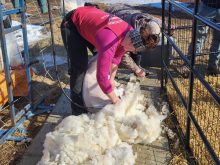The Canadian goat industry is encouraging producers to participate in the Canadian Food Inspection Agency’s scrapie surveillance program.
Since mid-May, the CFIA and the Canadian National Goat Federation have operated a voluntary tagging program for goats as a way to randomly test for scrapie, a brain wasting disease similar to BSE in cattle.
Tags are free and tagging is done by CFIA staff or the owner in the presence of CFIA staff.
Federation general manager Allison Taylor said the CFIA originally wanted the program to be mandatory.
Read Also

Charges laid after cattle theft
Saskatchewan RCMP lay two charges against a man after six cattle went missing.
“We kind of objected to that, so we are in the process of drafting our own national ID program that should be ready to go live in a year or so,” she said.
“It is currently voluntary and we are encouraging producers to participate. Hopefully, we will get enough of them to meet the CFIA’s needs for scrapie surveillance. They have reserved the right to make it mandatory in the future if they don’t get enough participation.”
CFIA’s goal is to tag several thousand goats representing all areas of Canada and all sectors, including meat, dairy and fibre. Without a system for tracing infected goats to their farm of origin, the CFIA has been unable to conduct random sampling or surveillance.
According to the Cangoats website, the CFIA has said the program will become mandatory next year if the number volunteered to be tagged is insufficient.
Guenette Bautz, president of the Saskatchewan Goat Breeders Association, said participating in the program would help move the industry forward.
“There’s an advantage for the industry to realize how big we actually are. Also, with the CFIA tracing we can predict, reduce and prevent disease.”
Bautz, along with her husband Ryan, raises 150 Boer and LaMancha does on their beef cattle and grain farm near Middle Lake, Sask.
While goat producers who sign up now will receive free tags, which are worth about $1.50 each, the biggest advantage of the program will be improved and more accurate statistics, she said. The CFIA will send staff to help producers tag their animals.
“Eventually this is going to be mandatory. By volunteering your herd now, the work will already be done and the tags paid for,” Bautz said.
According to 2006 census figures, there were almost 180,000 goats on more than 6,700 farms in Canada.
















